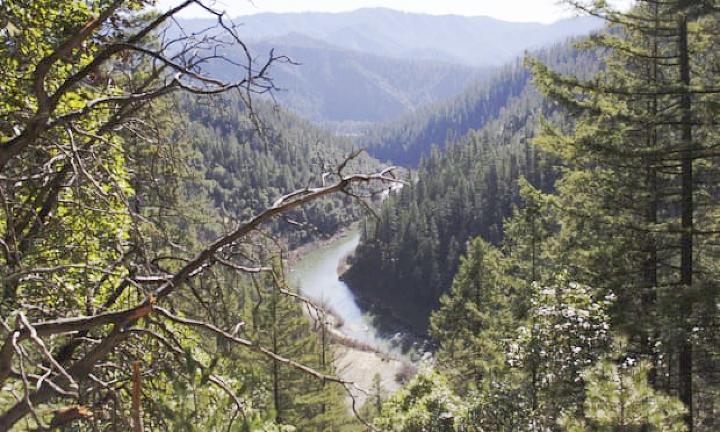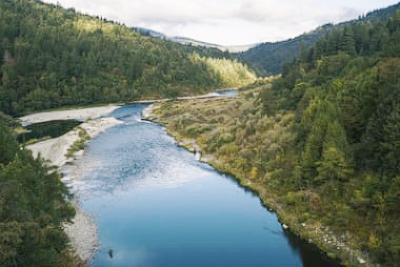 |
Canku Ota
|
 |
|
(Many Paths)
|
||
|
An Online Newsletter
Celebrating Native America
|
||
|
February 2021 - Volume
19 Number 2
|
||
|
|
||
|
'Piecing Together
A Broken Heart': Native Americans Rebuild Territories They Lost
|
||
|
by Hallie Golden - The
Guardian
|
||
|
Tribes across the
US are buying back land lost during and after the colonization period
on the open market
More than six decades after a 1,705-acre patchwork of meadows, wetlands and timberland in southern Oregon was taken from the Klamath Tribes, the Native American community has found its way back to the territory – by way of the real estate market. Over the summer, the tribes discovered the land was up for sale, so as part of their large-scale effort to reacquire territory that was historically theirs, they prepared an offer. Although another buyer nearly swooped in, the tribes' purchase more than doubles their current holdings, and extends their territory to the base of Yamsay Mountain, an important site for prayer and spiritual journeys for the community. Willa Powless, Klamath Tribes' council member at large, said it was major step toward piecing together a "broken heart". "Our people are born with a spiritual connection to the land that we all feel and we all know and our elders teach us about," she said. Getting back that "big of a piece of land, especially undeveloped land, is really powerful. And it's probably one of the most healing processes we've gone through in a long time." The Klamath purchase is just the latest example of tribes across the US buying back land lost during and after the colonization period on the open market. Sarah Krakoff, a law professor at the University of Colorado Boulder and an expert on Native American law, said she has noticed the rise in such acquisitions over the last several decades after tribes were able to rebuild their governmental functions and obtain funds. "The 70s were the starting point, but then it takes a while to develop all the kinds of infrastructure – you need legal expertise, management savvy and expertise, and ways to acquire or arrange for transactions," she said. The Oneida Nation of Wisconsin, for example, has managed to buy back two-thirds of its original 65,432-acre reservation, much of which was lost through "deceit and trickery", said Bobbi Webster, the tribe's public relations director. They have been able to get the majority of it back within just the last 20 years, purchasing it through individuals who put it up for sale and real estate companies who put it on the market. Sarah Krakoff, a law professor at the University of Colorado Boulder and an expert on Native American law, said she has noticed the rise in such acquisitions over the last several decades after tribes were able to rebuild their governmental functions and obtain funds. "The 70s were the starting point, but then it takes a while to develop all the kinds of infrastructure – you need legal expertise, management savvy and expertise, and ways to acquire or arrange for transactions," she said. The Oneida Nation of Wisconsin, for example, has managed to buy back two-thirds of its original 65,432-acre reservation, much of which was lost through "deceit and trickery", said Bobbi Webster, the tribe's public relations director. They have been able to get the majority of it back within just the last 20 years, purchasing it through individuals who put it up for sale and real estate companies who put it on the market. The Oneida "really began to flourish or expand our economic development with the onset of gaming in the 1980s, so generating revenues from our gaming operations, we were able to identify set-asides throughout the years to purchase land", said Webster. The Yurok Tribe in California has purchased about 80,000 acres in just the past decade. Frankie Myers, vice-chairperson, said the tribe is fortunate that most of its ancestral territory is owned by one logging company, so it only has to negotiate with one seller. But, he said, "it's still a daunting task to come up with these huge amounts of money to pay for it and how you pay it back".
The process of reacquiring this land stands in sharp contrast to how they lost it in the first place. About 150 years ago, the Klamath Tribes ceded more than 23m acres of traditional lands to the US, signing a treaty to ultimately establish a reservation of about 1.8m acres. But those acres were steadily whittled down and by 1954, the federal government forcibly terminated their tribal recognition and the community lost its remaining thousands of acres. Now, with their federal recognition back intact, the Klamath Tribes are working to reacquire much more of this lost land in order to protect the environment and enhance their fishing, hunting and foraging rights. "I hear elders say, 'The land doesn't belong to us, we belong to it.' And I think that's true," said Clayton Dumont, Klamath council member at large. "The more of it we get back, the more we can care for it, the healthier the land will be and the healthier we will be." Once the land is bought, it is an arduous process to obtain full governing authority over it, including being able to make laws and also impose taxes while typically being immune from state taxes. To do so, tribes must convert the parcel into trust land, by which the federal government holds it in trust on the tribe's behalf. According to the US Department of Interior, about 56m acres of Native lands have been put into trust. The Eastern Band of Cherokee Indians, in North Carolina, currently has two applications in the middle of this process, said the tribe's principal chief, Richard Sneed. One includes Kituwah, a town he described as the birthplace of the Cherokee and "the most sacred piece of Cherokee land to all Cherokees everywhere". It has been about three years since the application process was initiated, and Sneed said just a couple of weeks ago, he received a letter from the Bureau of Indian Affairs saying they had only reached step eight of the 16-step process. The Klamath Tribes could be in for a long wait with their latest purchase. But even just purchasing this piece of land is a key accomplishment for them. In the past, they say, they have dealt with instances of racism and negativity from the broader local community when it comes to them getting more land. As they maneuvered their way through this latest deal, they have kept the reacquisition extremely quiet, even delaying any interviews with the local paper about it and not publicly releasing the price they paid. But now that it has been finalized, the community is planning a celebration for the summer, and also already looking toward their next land acquisition. "For me it's super significant, but I don't want to be complacent and be satisfied," Jared Hall, the Klamath Tribes planning director. "I want to stay hungry in the land acquisition effort. I think if you stay complacent and you don't want to wake up and try to fight for more land," and instead a tribe is "happy with what you got … I think that's what you'll get". |
||||
|
|
|
|
||
|
|
||
| Canku Ota is a free Newsletter celebrating Native America, its traditions and accomplishments . We do not provide subscriber or visitor names to anyone. Some articles presented in Canku Ota may contain copyright material. We have received appropriate permissions for republishing any articles. Material appearing here is distributed without profit or monetary gain to those who have expressed an interest. This is in accordance with Title 17 U.S.C. Section 107. | ||
|
Canku Ota is a copyright ©
2000 - 2021 of Vicki Williams Barry and Paul Barry.
|
||
 |
 |
|
|
The "Canku
Ota - A Newsletter Celebrating Native America" web site and
its design is the
|
||
|
Copyright ©
1999 - 2021 of Paul C. Barry.
|
||
|
All Rights Reserved.
|
||

